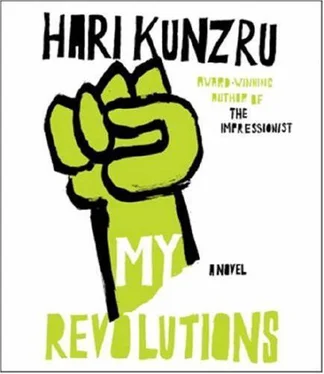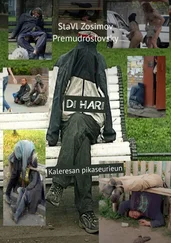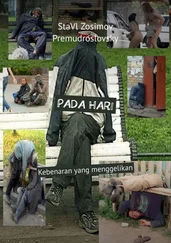I remember the sound of my breathing, ragged and heavy and somehow detached from my body as I carried a wooden box across the yard toward the hole we’d cut in the fence. Light rain falling on my face, the endlessness of the space between the warehouse and the gap in the wire. The open steppe.
Back at Thirteen we sat around the kitchen table, staring at our haul. It looked like bars of some kind of confectionery, each yellow block wrapped individually in waxed paper. We had a hundred and fifty charges of nitroglycerine gel, a spool of safety fuse and fifty PETN detonators. I don’t think any one of us knew what to say. There was no exultation, no sudden release of tension. We just sat there. I don’t know about the others, but I didn’t sleep that night. The mere presence of the stuff, hidden in a metal box under the floorboards, imposed a density, a pressure on the atmosphere that made it impossible.
Since none of us knew anything about explosives, our plan was to do some tests, drop a stick down a hole somewhere and see how big a bang it made. We told ourselves we’d proceed slowly. We’d take care.
Richard Nixon put an end to that. On May Day we woke up to his announcement that he was sending U.S. combat troops into Cambodia. It was a massive escalation of the conflict. “This is not an invasion,” said the President, describing the movement of several thousand troops across the border. America couldn’t be a pitiful helpless giant while the forces of totalitarianism and anarchy were threatening free nations everywhere. Here was the man who’d told voters he had a “secret plan to end the war,” shuffling his notes
and gesturing vaguely at a map on an easel as he told us why more killing was the right thing for everyone.
We had to respond. He’d given us no choice.
In principle the device was straightforward. An electric current initiated the detonator. The detonator initiated the gel. A kitchen timer from Woolworths would close the circuit. The timer was shoddy and imprecise, but as long as you didn’t set it too short, it would do the job. I was the one who knew about electricity, so I was the one who sat down at our long wooden table and spread out tape and tools and wire and batteries and made a bomb. I told the others to go out for the afternoon. As I worked, all I could think about was what would happen if I made a mistake. I could already feel the explosion welling up inside me, as if merely thinking about it tapped a disintegration already latent in my body. Only a month previously, a group of New York radicals had blown themselves up in a Greenwich Village townhouse. Rich kids, said the newspapers. Stupid nihilistic rich kids who got themselves killed. Nothing was mentioned in the articles about their politics.
Stripping the plastic coating from the wire to expose the core, twisting the ends. My hands shaking. It was, essentially, no more complex than wiring a plug, but it seemed to take forever.
Late that night we put the bomb in a blue leather handbag (a jumble-sale purchase of Helen’s) and left it against the front door of an American bank near the Mansion House. It was a weekend and the City of London was deserted. A stage set, waiting for the play to begin.
A BOMB TO HALT THE MONEY MACHINE
Nixon invades Cambodia. More blood on his hands. Bankers and arms companies pull the levers.
THEY profit. WE die.
U.S. trade supports mass murder. U.K. government wants a piece of the action.
* * *
It’s time to RESIST.
Numbers for Nixon:
U.S. military spending 1968, 9.4 % of GDP. U.S. soldiers killed last year, 9,414 killed, 55,390 wounded.
Vietnamese and Cambodian dead are not counted, hundreds of thousands so far, maybe millions.
We are acting in solidarity with all oppressed people across the world. Our attack is violent because violence is the only language THEY understand.
RISE UP!
MAY DAY 1970
We posted copies of our communiqué to mainstream newspapers and the underground press. From telephone booths we phoned the BBC and ITV, claiming responsibility. Then we waited. Three days later there had been no response. No news reports. No commentary. No acknowledgment at all. It was as if the bomb hadn’t detonated. But we’d heard the sound, a muffled crump. We’d seen emergency vehicles racing toward the scene. The day afterward the bank was closed. Wooden boards covered the building’s ground-floor façade.
Does something exist if it’s unobserved? Does something happen if it is not reported?
* * *
Renounce anger, forsake pride. Sorrow cannot touch the man who is not in thrall to anything, who owns nothing . This car, with its silt of water bottles and maps and fast-food packaging in the footwell. This body.
It smells, this body that is not my body. These unwashed clothes, these furred teeth. This face coated with grime and sweat.
South of Paris the country has changed. The air is warm and pine trees line the road. I catch a glimpse of a river, a flash of blue water scattered with white boulders. On impulse I take the next turning and make my way down toward it. Leaving the car in a clearing carpeted with pine needles and scraps of blue plastic, I pick my way to the water, where the light is harsh and bright. I take off my shirt and shoes. The stones are painfully hot, a bed of coals for me to walk across. No one seems to be around, so I strip naked and wade into the deepest part of the river, where it’s slimy underfoot and the shock of the cold, up to my knees, thighs, chest, persuades me that I’m still more or less alive. I stay in until I’m shivering, then clamber onto a large flat boulder and lie down. The sun quickly begins to dry off my skin.
I’m exhausted.
An orange bloom of light on my closed eyelids. Orange wallpaper in a hotel room, nauseating op-art swirls rotating as I drink and fret and wait for Miles. Heat like the fierce heat of the dry season at Wat Tham Nok, when the ground hardens and the grass underfoot is parched and brittle. The lizard that squats for hours on the wall of my cell. It’s there when I go out to do my chores, still in the same spot when I get back. I sprinkle water on the ground in front of the farang block to lay the dust, sweep the flagstones, line up the battered metal buckets for the morning
purge, then walk over to the monastery office to help Phra Anan with the accounts and the registration letters. Translating the letters, learning scraps of French and Dutch and German: I pray for you to help my son with his addiction. I feel you are his last chance. . Every day the lizard is waiting for me, judging me with its little liquid eyes. How have I done? Have I trodden lightly? The tinselly promise of religion: follow the instructions, find the exit. Orange, fading to guilty red, flaring up to an unbearable dazzling white as I open my eyes, then fading again as I drowse, watching seven-year-old Sam playing with a bucket and spade, pottering around and chattering to some invisible friend. Her arms and legs are less chubby than last year, her game more organized. My daughter, not by blood but because I notice such changes. My daughter because I love. Miranda, some way down the beach, looking for fossils, stooping to examine a find. Anna, walking away up the hill. Tall, rangy Anna, smoking a cigarette. What will I say to you? I’m driving south because I have something to ask you, but do I know what it is? I think I want to ask why you carried on, even when you must have known the revolution wasn’t getting any closer, when it must have been obvious you weren’t changing anything, just piling up horror. Did you still have a choice, by then? Grainy photographs of the burning embassy building. Uniformed police gesturing, looking up at the balcony. How did you survive? Who was the dead woman if it wasn’t you? And who helped you, Anna? What deals did you have to make to be allowed to live in peace in your little village, to walk up the hill carrying a string bag of melons, smoking a cigarette? When you cut up the fruit at your table, what do you feel? When you look back at your life, does it make sense? That’s what I want to know. That’s the answer I need from you.
Читать дальше












